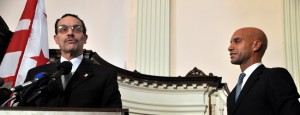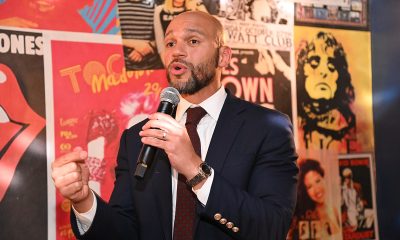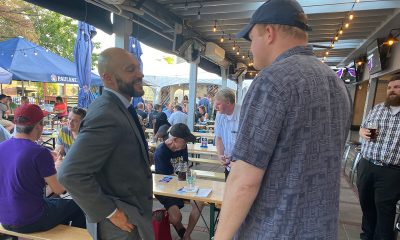Local
Fenty beat Gray in gay precincts
But visible LGBT enclaves are mostly in white neighborhoods
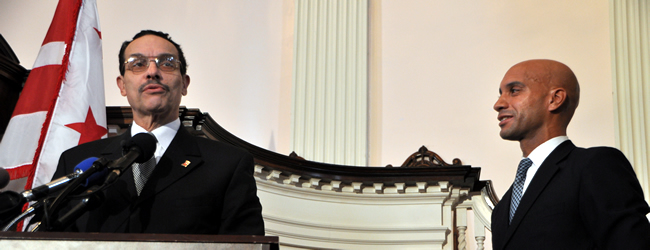
Editor’s note: Go here to see a breakdown of votes in the gayest neighborhoods. Our chart does not include the last of the 15 LGBT precincts we analyzed for this story — Precinct 23, which includes parts of Columbia Heights and the U Street, N.W. corridor. In that precinct, Fenty received 443 votes (57 percent) and Gray received 332 votes (42 percent).
Election returns for the city’s Sept. 14 Democratic primary show that Mayor Adrian Fenty won in 12 of the 15 electoral precincts believed to have high concentrations of LGBT residents, even though many LGBT activist leaders backed City Council Chair Vincent Gray for mayor.
Gray won the primary with a citywide vote of 54 percent to 44 percent, making him the strong favorite to win the November general election in a city where registered Democrats outnumber Republicans by a margin of nearly nine to one.
LGBT-supportive D.C. Council member Phil Mendelson (D-At-Large) also beat gay challenger Clark Ray, the city’s former parks and recreation director, by lopsided margins in all 15 of the gay-oriented precincts. Ray came in third behind Michael D. Brown, the city’s shadow senator, in all but one of the 15 LGBT precincts.
Many LGBT activists following the election said Ray was an attractive candidate but they saw no reason for backing him over Mendelson, who is one of the Council’s strongest supporters on LGBT issues.
While the visible “gay” precincts went for Fenty by wide margins, nearly all of those precincts are in majority white neighborhoods, suggesting that the LGBT vote could have split along the same racial lines as the city vote as a whole in the mayoral race.
All but one of the 15 precincts believed to have high concentrations of LGBT residents are in majority white Wards 1, 2 and 6, which Fenty won. Majority white Ward 3 also went heavily for Fenty.
Majority black Wards 4, 5, 7, and 8 went for Gray by wide margins.
Both Gray and Fenty have strong records of support on LGBT issues. Gray voted for and Fenty signed the city’s same-sex marriage law.
“The black gays in Washington, D.C. tend to be from Washington, D.C. and they live in all parts of the city,” said gay Democratic activist Brad Lewis, who is black. “So I don’t think there’s any one particular precinct that would be the black LGBT precinct,” he said. “I’m at a loss to tell you which one that would be.”
Lewis, a former president of the Gertrude Stein Democratic Club, the city’s largest LGBT political group, joined other activists who hold the view that most black gays voted for Gray.
“I think there were a lot of concerns, especially in the African-American community that their voices weren’t necessarily being listened to by Mayor Fenty,” Lewis said. “I think that transcended sexual orientation.”
Gay Democratic activist Phil Pannell, who also lives in Ward 8 and who backed Gray, has identified Precinct 112 in Ward 8’s Anacostia neighborhood as the one precinct east of the Anacostia River where an identifiable concentration of black gays live. Gray won Precinct 112 by a wide margin.
The precincts selected as areas where high concentrations of LGBT people live include the longstanding gay neighborhoods of Dupont Circle, Adams Morgan, and Logan Circle. They also include areas where large numbers of LGBT people have migrated in recent years such as Columbia Heights, Shaw and the U Street, N.W. corridor that stretches between 9th Street and 17th Street.
Two precincts on Capitol Hill and Precinct 127 in the Southwest D.C. waterfront neighborhood are also included as LGBT-oriented areas.
In addition to winning in Precinct 112 in Anacostia, Gray won Precincts 127 in Southwest and 18 in Shaw, which are believed to have large numbers of black LGBT residents.
Speculation begins on appointments
Gray most likely will name a new director of the city’s Office of GLBT Affairs and ask Police Chief Cathy Lanier to remain in her position, according to sources familiar with Gray.
Gray’s impending decision on whether to retain controversial city schools Chancellor Michelle Rhee has captured the attention of the media and most political insiders.
But to many LGBT activists, Gray’s decision on whether to keep Lanier as chief and his working relationship with her should she stay on will have a critical impact on the status of the department’s Gay & Lesbian Liaison Unit and efforts to combat hate crimes.
During his campaign for mayor, Gray criticized Fenty’s decision to adopt a plan by Lanier to downsize the GLLU’s central headquarters as part of an effort to create a system of affiliate GLLU officers in each of the department’s seven police districts.
“I don’t think it should be an either-or proposition,” Gray told the Blade in an August interview, saying he would prefer to have a fully staffed GLLU headquarters along with affiliate officers.
The local group Gays and Lesbians Opposing Violence has complained that Lanier spurned their longstanding request to retain a fully staffed GLLU headquarters office, which GLOV says is needed to train and coordinate the affiliate officers.
Once source familiar with the Gray campaign said Gray would likely set a policy on how the GLLU should be set up and ask Lanier to follow that policy should he decide to retain Lanier. But one police source said Lanier feels strongly about keeping in place the changes she has made with the GLLU.
The source, who spoke on condition of not being identified, predicted Lanier would resist Gray’s plan to add more officers to the GLLU’s central office, a development that would “test” Gray’s resolve in keeping to his campaign promise to restore the GLLU to a staffing level set by former Police Chief Charles Ramsey under the administration of Mayor Anthony Williams.
Gray has declined to disclose his plans for appointments for all city agencies, saying it would not be appropriate for him to discuss personnel matters until after the November general election.
Most local activists have praised Christopher Dyer, who has served since 2007 as director of the GLBT Affairs Office under Fenty. But sources close to the Gray mayoral campaign, who spoke on condition that they not are identified, said they expect Gray to name his own person to head the GLBT office.
The City Council created the office through legislation introduced by gay Council member Jim Graham (D-Ward 1) during the Williams administration. The legislation also established a mayoral GLBT advisory committee, to which Fenty named Dyer as chair.
Gray has said he strongly supports the GLBT Affairs Office and its advisory panel. During his campaign for mayor he has said the office and advisory panel would play an important role in his administration if he were elected mayor.
Some activists have speculated that Jeffrey Richardson, president of the Gertrude Stein Democratic Club, which endorsed Gray for mayor, and Christopher Fitzgerald, coordinator of Gray Pride, an LGBT committee established under Gray’s mayoral election campaign, would be among the candidates Gray would likely consider to head the LGBT Affairs Office.
Neither Richardson nor Fitzgerald could be reached for comment by press time.
Maryland
A Baltimore theater educator lost jobs at Johns Hopkins and the Kennedy Center
Tavish Forsyth concluded they could not work for Trump
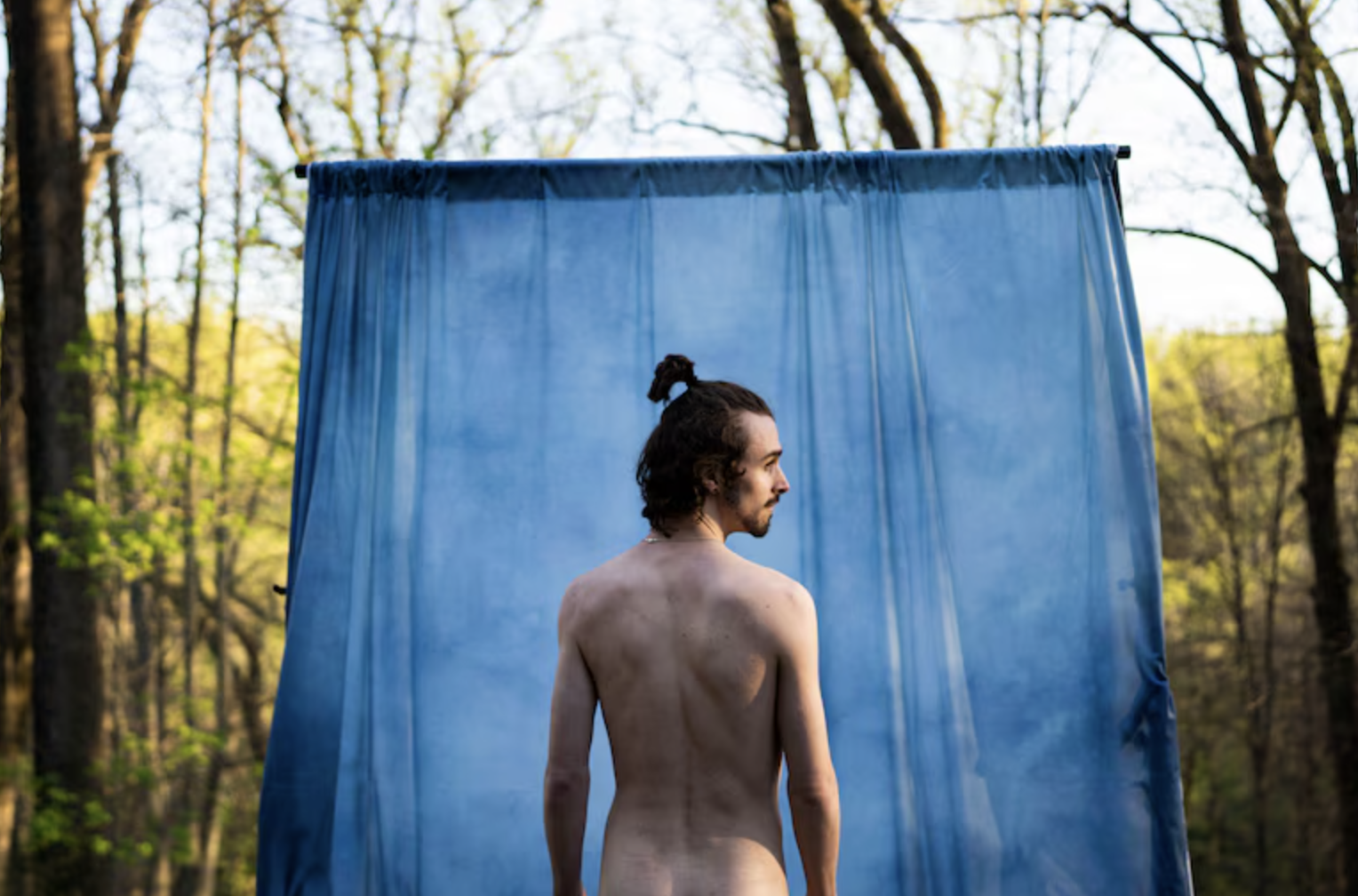
BY WESLEY CASE | Tavish Forsyth had come to a conclusion: They could not work for President Donald Trump.
So the 32-year-old Baltimore resident stripped down, turned on their camera, and lit their career on fire.
“F—— Donald Trump and f—— the Kennedy Center,” a naked Forsyth, an associate artistic lead at the Washington National Opera’s Opera Institute, which is run by the Kennedy Center, said in a video that went viral. The board of the nation’s leading cultural institution had elected Trump just weeks prior as its chairman after he gutted the board of members appointed by his predecessor, President Joe Biden.
The rest of this article can be read on the Baltimore Banner’s website.
District of Columbia
Little Gay Pub to host April 25 celebration of life for Patrick Shaw
School teacher, D.C. resident praised for ‘warmth, humor, kindness’
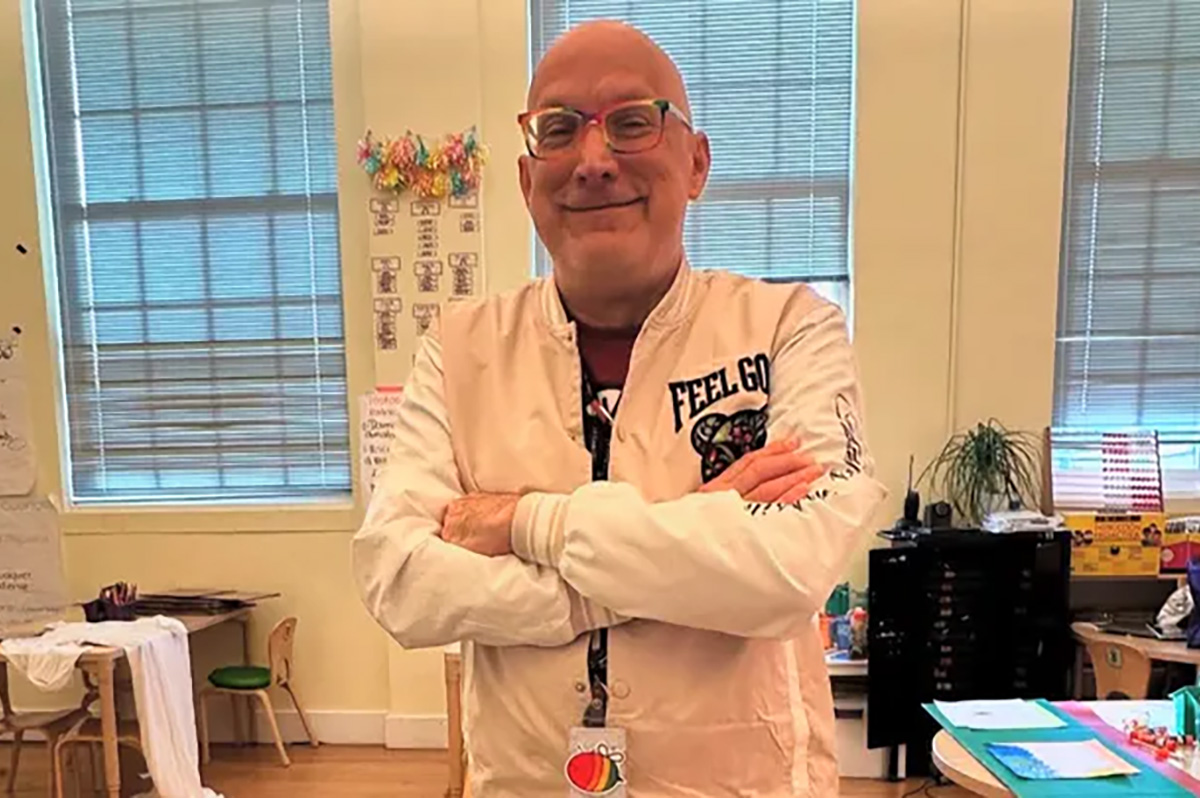
Co-workers and friends will hold a celebration of life for highly acclaimed schoolteacher and D.C. resident Patrick Shaw beginning at 5:30 p.m. Friday, April 25 at The Little Gay Pub 1100 P St., N.W.
Little Gay Pub co-owner and Shaw’s friend, Dusty Martinez, said Shaw passed away unexpectedly on April 19 from a heart related ailment at the age of 60.
“Patrick touched so many lives with his warmth, humor, kindness, and unmistakable spark,” Martinez said. “He was a truly special soul – funny, vibrant, sassy, and full of life and we are heartbroken by his loss.”
In an Instagram posting, Shaw’s colleagues said Shaw was a second-grade special education teacher at the J.F. Cook campus of D.C.’s Mundo Verde Bilingual Public Charter School.
“Patrick brought warmth, joy, and deep commitment to Mundo Verde,” his colleagues said in their posting. “His daily Broadway sing-alongs, vibrant outfits, and genuine love for his students filled our community with energy and laughter.”
The posted message adds, “Patrick was more than a teacher; he was a light in our school, inspiring us all to show up with heart, humor, and kindness every day. His spirit will be deeply missed.”
The Washington Blade is preparing a full obituary on Patrick Shaw to be published soon.
District of Columbia
D.C. police seek help in identifying suspect in anti-gay threats case
Victim threatened with assault, called ‘faggot’ as he left Capitals game
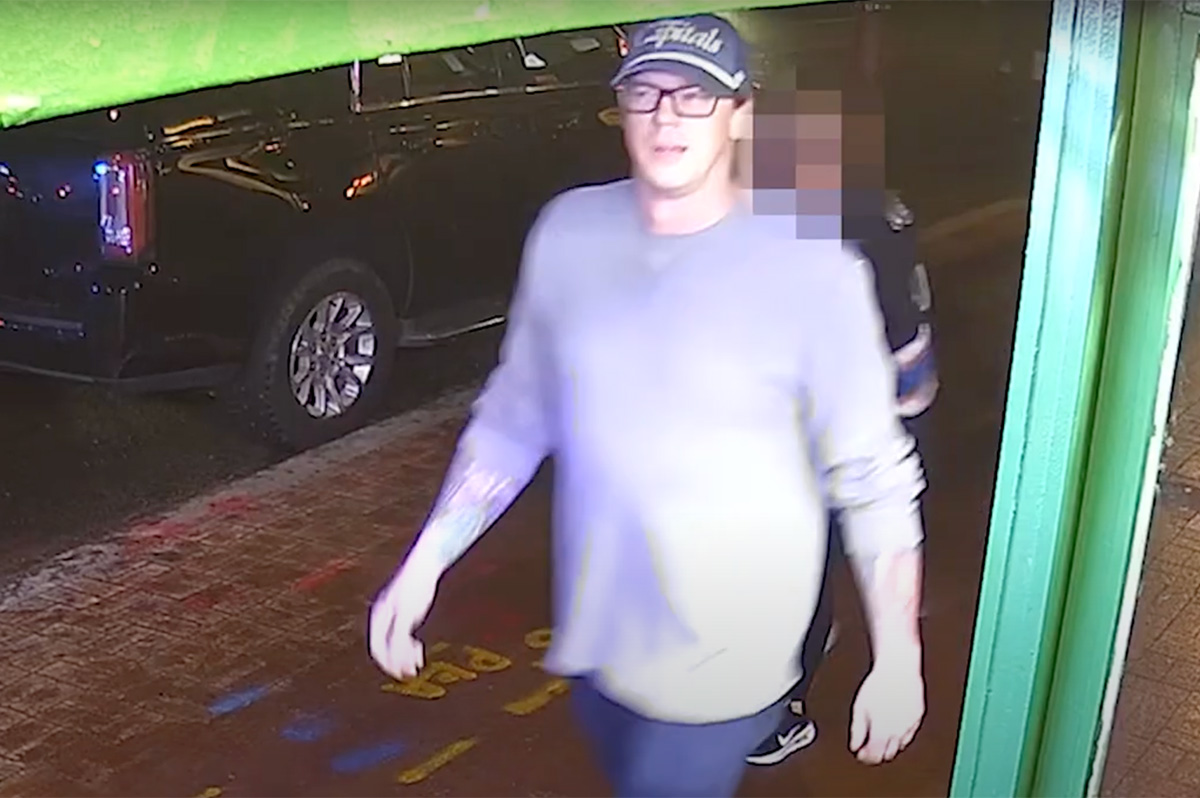
D.C. police are seeking help from the public in identifying a male suspect whose image was captured by a video surveillance camera after he allegedly shouted anti-gay slurs and threatened to assault a man at 6th and H Streets, N.W. on March 20 at about 9:54 p.m.
A police report says the victim told police the incident took place shortly after he exited the nearby Capital One Arena where he had attended a Washington Capitals hockey game.
The police report says the incident began when the victim saw the suspect yell a racist slur at a person behind the victim and started to berate a valet operator.
“Suspect 1 then turned his attention to Victim 1 and called him a ‘faggot’ among other homophobic slurs,” the report says. It says the victim then used his phone to record the suspect, prompting the suspect to walk away before returning and “snatching” the phone from the victim’s hand.
“Suspect 1 walked several feet as Victim 1 followed, requesting his phone back,” the report continues. “Suspect 1 stopped and turned to Victim 1 and while yelling other obscenities exclaimed ‘if you keep recording, I’m going to kick your ass.’” The report concludes by saying the victim was able to recover his phone.
It lists the incident as a “Threats To Do Bodily Harm” offense that is a suspected hate crime.
“Anyone who can identify this suspect or has knowledge of this incident should take no action but call police at 202-727-9099, or text your tip to the Department’s TEXT TIP LINE at 50411,” according to a separate police statement released April 23.
The statement says police currently offer an award of up to $1,000 to anyone who can provide information that leads to an arrest and indictment of the person or persons responsible for a crime committed in D.C.
D.C. police spokesperson Tom Lynch said the case has been under investigation since the incident occurred on March 20. He said the video image of the suspect, most likely obtained from a security camera from a nearby business, was released to the public as soon as it was obtained and processed through the investigation.
-

 Federal Government3 days ago
Federal Government3 days agoHHS to retire 988 crisis lifeline for LGBTQ youth
-

 Opinions3 days ago
Opinions3 days agoDavid Hogg’s arrogant, self-indulgent stunt
-

 District of Columbia2 days ago
District of Columbia2 days agoD.C. police seek help in identifying suspect in anti-gay threats case
-

 Virginia3 days ago
Virginia3 days agoGay talk show host wins GOP nom for Va. lieutenant guv

